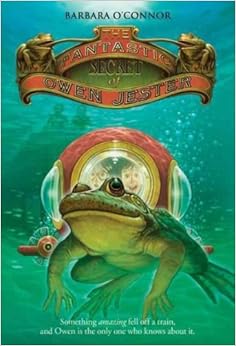
Jack Baker does not want to go to boarding school. His father is in the military, though, and since Jack's mother's death, it seems like the easiest solution. At school he meets an odd kid named Early Auden, and by befriending Early, Jack guarantees that he will never fit in. (One of the things that makes Early so strange is that he reads the number Pi as a story -- one that he thinks he is living in. I know that sounds hard to imagine, but it makes total sense in the story). Soon it is holiday break, and when Jack's dad doesn't show up, he decides to go with Early on a journey to find out the truth about the great Appalachian bear and the school's legendary hero, the Fish.
They set out by boat and soon find themselves dodging criminals, living in the wild, and discovering the answers to questions they didn't even know they were asking. This is a great book for fifth or sixth and up, especially boys (though there is plenty here to keep any reader busy). The realistic detail makes this book a good one to introduce nonfiction readers to fiction -- especially those who swear they don't like made-up stories. There are enough themes here to make this not only a good read-aloud book, but a book worthy of study in language arts class (or actually, math classes would enjoy it too). The only potential drawback here is that the eastern prep school context might not connect with students from non-white, non-upper class backgrounds.
O'Connor, Barbara (2010) The Fantastic Secret of Owen Jester. New York: Frances Foster Books.

Owen Jester has problems. He has found an excellent frog (who he named Tooley) to be his pet, but Tooley is not doing well in captivity. Owen's other problem is named Viola. She is bossy and annoying and always getting into his business. These two problems are starting to make his summer look pretty bleak. Then, late one summer night, he hears the sounds of something big falling off a freight train as it rolls through town. It takes a couple of days, but before long, Owen and his friends (and eventually Viola) find a huge crate in the ditch next to the tracks. They open the crate and find a two-person submarine. Owen hatches a plan to get the sub out of the ditch, across the road, down the hill, and into the pond where they can try it out. Moving the sub (and keeping it secret) turns out to be a far greater adventure than any of them thought. Although it doesn't have quite the level of realistic detail that Navigating Early does, it is a completely believable book.
Fourth graders and up of both genders will enjoy this book. There is a little bit of science here, and it has some interesting themes of friendship and cooperation, but this is probably a classroom library kind of book.
Lord, Cynthia (2010) Touchblue. New York: Scholastic.

Tess is happy living on an island (I think in Maine) with her lobster-fishing dad and her school-teaching mom. When the state threatens to shut down the island's school because of low enrollment, several families on the island decide to take in foster children. Soon, Tess's family is welcoming Aaron, a red-haired trumpet player whose mom has substance abuse issues and is unable to raise him -- and soon Aaron and Tess are having to deal with Eban, their school's resident bully/jerk.
This book is a bit like a ride in a lobster boat during high seas. At times it is predictable, at times it is not. There are lost of snags and sandbars and floating logs it could run aground on, but it doesn't. I kept expecting some sort of major gaffe or generalization about foster care that would make me cringe. It never happened, And the ending brought the story safely into harbor.
As adventure stories go, this one is a little laid back -- but it reads like a lazy summer day. This would make a good read-aloud for fourth or fifth grade (good for both genders -- though maybe tipped a little toward girls.). I am not sure there is enough here to make it worthy of class study (though maybe as one of several options for literature circles...). It is certainly a good book to have in your classroom library. It is certainly a realistic story with only a few coincidences that stretch believability a bit. Satisfying ending.
Malone, Marianne (2011) Stealing Magic: A Sixty-Eight Rooms Adventure. New York: Random House.

Ruthie and Jack have discovered a magical way to shrink down and enter the Throne Rooms in Chicago's Art Institute -- and through those rooms, to travel in time. Unfortunately, someone else has access to that magic, and they are stealing valuable pieces of art and selling them. Ruthie and Jack need to find and return the items, catch the culprit, and somehow make sure that no one finds out about the magic.
If you have ever seen the Thorne Rooms, you will know how infectious the idea of entering their worlds can be. This sort of adventure, though, is more for those who like a dash of fantasy with their realism. Fourth or fifth grade and up for this one, skewing slightly toward girls. There is some history and architecture here, but more on the level of getting kids interested. Might be fun to pair this book with some non-fiction that ties into some of the period or architectural concepts introduced here. Good for a classroom library, but I don't think this one will stand up to being a read aloud or the subject of language arts study.
No comments:
Post a Comment